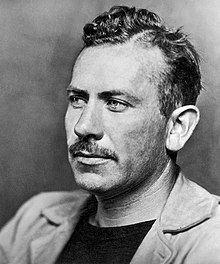
Back John Steinbeck Afrikaans John Steinbeck AN جون ستاينبيك Arabic جون ستاينبيك ARZ John Steinbeck AST John Steinbeck AVK John Steinbeck Aymara Con Steynbek Azerbaijani جان ایشتاین بک AZB Джон Стэйнбек Byelorussian
John Steinbeck | |
|---|---|
 Steinbeck in 1939 | |
| Born | John Ernst Steinbeck II February 27, 1902 Salinas, California, U.S. |
| Died | December 20, 1968 (aged 66) New York City, U.S. |
| Occupation |
|
| Education | Stanford University |
| Notable works |
|
| Notable awards |
|
| Spouses | Carol Henning
(m. 1930; div. 1943)Gwyn Conger
(m. 1943; div. 1948) |
| Children | Thom, John IV |
| Signature | |
John Ernst Steinbeck (/ˈstaɪnbɛk/ STYNE-bek; February 27, 1902 – December 20, 1968) was an American writer. He won the 1962 Nobel Prize in Literature "for his realistic and imaginative writings, combining as they do sympathetic humor and keen social perception".[2] He has been called "a giant of American letters."[3][4]
During his writing career, he authored 33 books, with one book coauthored alongside Edward Ricketts, including 16 novels, six non-fiction books, and two collections of short stories. He is widely known for the comic novels Tortilla Flat (1935) and Cannery Row (1945), the multigeneration epic East of Eden (1952), and the novellas The Red Pony (1933) and Of Mice and Men (1937). The Pulitzer Prize–winning The Grapes of Wrath (1939)[5] is considered Steinbeck's masterpiece and part of the American literary canon.[6] By the 75th anniversary of its publishing date, it had sold 14 million copies.[7]
Much of Steinbeck's work employs settings in his native central California, particularly in the Salinas Valley and the California Coast Ranges region. His works frequently explored the themes of fate and injustice, especially as applied to downtrodden or everyman protagonists.
- ^ The Swedish Academy cited The Grapes of Wrath and The Winter of Our Discontent most favorably.
"The Nobel Prize in Literature 1962: Presentation Speech by Anders Österling, Permanent Secretary of the Swedish Academy". NobelPrize.org. Archived from the original on April 19, 2008. Retrieved April 21, 2008. - ^ "Nobel Prize in Literature 1962". Nobel Foundation. Archived from the original on October 21, 2008. Retrieved October 17, 2008.
- ^ "Swedish Academy reopens controversy surrounding Steinbeck's Nobel prize". The Guardian. January 3, 2013. Archived from the original on October 22, 2013. Retrieved January 12, 2019.
- ^ "Who, what, why: Why do children study Of Mice and Men?". BBC News. BBC. March 25, 2011. Archived from the original on January 7, 2015. Retrieved December 6, 2014.
- ^ "Novel". The Pulitzer Prizes. Archived from the original on August 21, 2008.
- ^ Bryer, R. Jackson (1989). Sixteen Modern American Authors, Volume 2. Durham, NC: Duke University Press. p. 620. ISBN 978-0-8223-1018-1.
- ^ Chilton, Martin (September 16, 2015). "The Grapes of Wrath: 10 surprising facts about John Steinbeck's novel". The Telegraph. Telegraph (London). Archived from the original on October 10, 2022. Retrieved October 13, 2022.